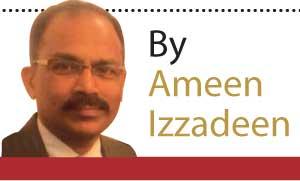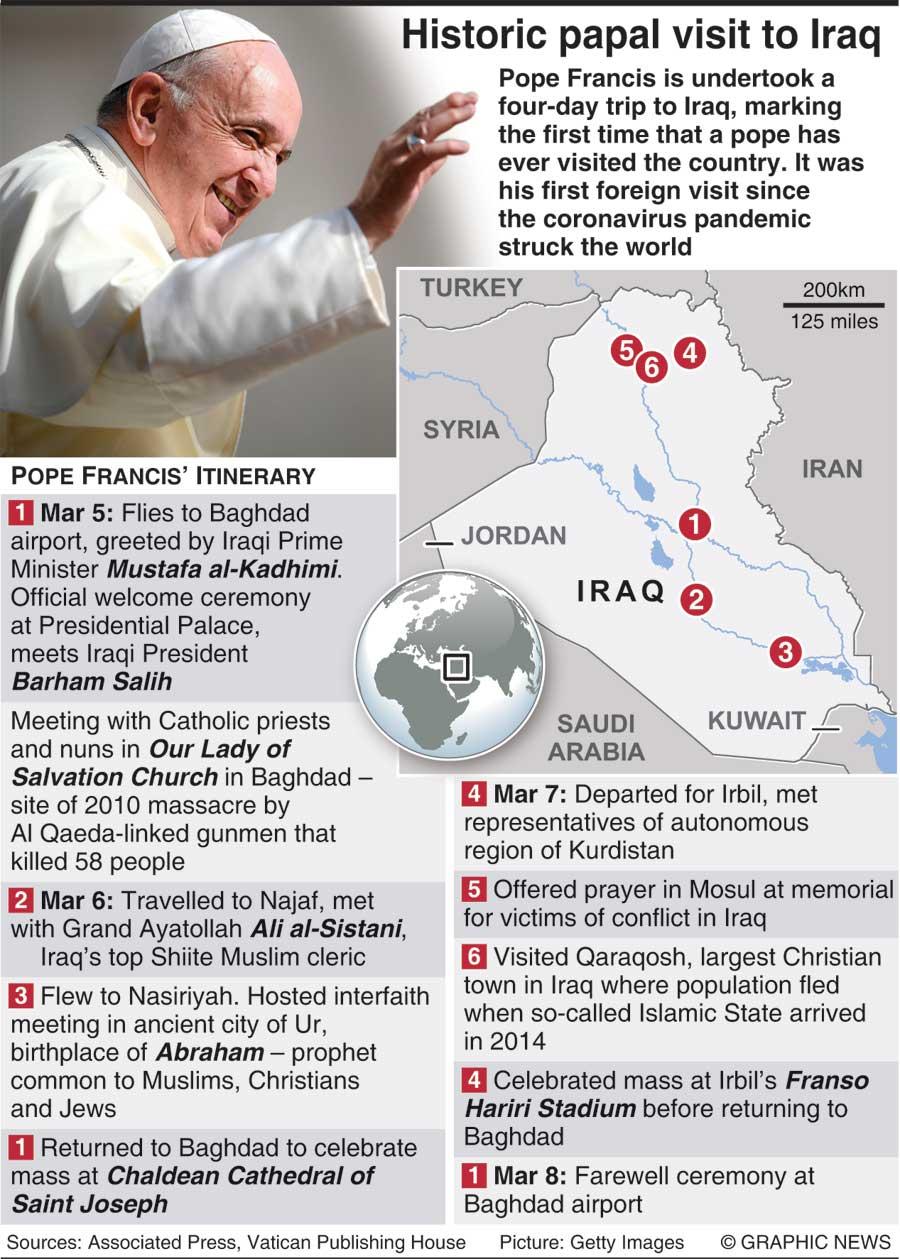Reply To:
Name - Reply Comment
Around three thousand years before Jesus Christ was born in Bethlehem, about 1,300 kilometres east at Ur in present day Iraq was born Abraham the patriarch of the world’s monotheistic religions – Judaism, Christianity, Islam and other such faiths.
present day Iraq was born Abraham the patriarch of the world’s monotheistic religions – Judaism, Christianity, Islam and other such faiths.
About five thousand years after Abraham began his ministry to sow the seeds of monotheistic renewal, Pope Francis, as the representative of the world’s 1.2 billion Catholics, last Friday embarked on a four-day historic visit to the birthplace of the patriarch who fathered two nations through his two sons – Isaac who is referred to in the Quran as Is’haaq and Ishmael, referred to in the Quran as Isma’eel. From the progeny of Isaac emerged great prophets. The Bible mentions a long list of them and the Quran some of them. From the progeny of Ishmael came the Prophet Muhammad, who, according to Muslims, was God’s final messenger to preach the religion of Abraham.
At a time when some international theorists vehemently expound a civilisational clash between religions and cultures, the pontiff’s Iraq mission was seen as a fresh bid to strike inter-faith unity among Abrahamic religions. In a broader sense, the visit also emphasised unity among all people whether they are monotheists, polytheists, atheists or agnostics. This was the common thread or the theme that bound together every stop of the papal visit in Iraq.
After visiting the war ravaged Iraqi cities where once Muslims, Shiites and Sunnis, Christians, Yazidis and Sabians lived in harmony before the unity was shattered first by the US-led invaders in 2003 and then by the ruthless Islamic State (ISIS) terrorists, the 84-year-old Pope said, “We reaffirm our conviction that fraternity is more durable than fratricide, that hope is more powerful than hatred, that peace is more powerful than war.”
Saddam Hussein could be a heartless killer, but his government was secular. He believed in unity in diversity. There were many Christians in his cabinet. Among them was Tariq Aziz, a Chaldean Catholic. He was the deputy prime minister, foreign minister and close advisor of Saddam. Iraqi Christians numbered about 1.5 million, or six percent of Iraq’s 24 million-strong population in 2003. That was when the US-led coalition forces launched their war to find and eliminate Iraq’s weapons of mass destruction (WMD) though the undeclared objective of the war was to plunder Iraq’s oil. They could not find a single WMD.
Today there are only less than 300,000 Christians in Iraq. More than 1.2 million Christians fled the country when they found that the new Iraq the Americans have founded was not a safe place for them, with the once peaceful country being turned into a hell hole of sectarianism and religious hatred. The cycle of violence is yet to end although the United States has ended its combat operations and withdrawn the bulk of its forces from Iraq, only to let ISIS capture large swathes of Iraq’s territory and establish its terror caliphate where, let alone Christians and other minorities, even Muslims who did not subscribe to ISIS’ hardline interpretation of Islam were rounded up and executed.
With his flock depleted in Iraq, Pope Francis who is leading a worldwide campaign for inter-religious dialogue, just as 800 years ago St. Francis of Assisi did, met in the holy city of Najaf the Grand Ayatollah Ali al-Sistani, the highest ranking spiritual leader of Shiite Muslims. Together, the two spiritual leaders delivered a powerful message for peaceful coexistence. According to reports, the 90-year-old Grand Ayatollah told the visiting Pope that Christians should live in peace in Iraq and enjoy the same rights as other Iraqis. The meeting at the Grand Ayatollah’s humble home was the first in Vatican and Islamic histories between the leader of the Catholic Church and the highest ranking Shiite spiritual leader.
The Vatican said Pope Francis thanked the Grand Ayatollah for having “raised his voice in defence of the weakest and most persecuted” during some of the most violent times in Iraq’s recent history. At a public Mass for the Iraqis – Christians and Muslims – the Pope said, “Ayatollah Sistani has a saying, I hope to recall it properly: ‘Men (people) are either brothers by religion or equal by creation.’” Bridging of this duality, according to the Pope, is a cultural journey.
The Pope also visited the ancient city of Ur, the birthplace of Abraham, Erbil, the capital of the autonomous Kurdistan region, and Mosul where he stood to offer prayers among the ruins of four churches destroyed by ISIS.
In Ur, known as the cradle of civilization, the pope attended a gathering of Iraqi religious leaders in an area where the ISIS had destroyed the 6000 years of ancient history that corroborated Abrahamic history.
The visit to war-torn Iraq, where rocket attacks and bomb blasts are still part of daily life, was also the first by the pope in a year after he was advised to cancel his foreign tours due the outbreak of the COVID-19 pandemic.
The Pope’s Iraq mission, which he undertook despite security and health risks, was in a way reminiscent of the odyssey of St. Francis of Assisi to Egypt in the 13th century in the middle of the Crusade, says Ibrahim al-Marashi, an associate professor at the Department of History, California State University.
In an article to the Al Jazeera website, he recounts that during the fifth crusade, the Catholic mystic set out to Egypt to try to promote peace and spread Christianity. During the siege on Damietta in 1219, he crossed enemy lines and succeeded in meeting Sultan al-Malik al-Kamil, nephew of Salaheddin (Saladin). The sultan declined his request that he embraced Christianity. But, impressed by his audacity, the sultan allowed St. Francis to preach for several days in Egypt.
Upon his return to Italy, St. Francis revised the rule of the Franciscan order, which he had established, to encourage his devotees to live among Muslims peacefully and avoid conflict. This move was truly revolutionary given the fact that the Church supported the crusades.
Just as St. Francis’ visit produced a positive call for inter-faith peace, it is hoped that the Pope’s visit will also generate enough energy to bring about unity among civilisations, religions and cultures.
But the biggest challenge to such unity is the bigotry of fanatics who are distorting peaceful messages of religious philosophies. Instead of promoting peace and co-existence, these bigots are spreading hatred and the message of violence. These fanatics include those invaded Iraq in 2003. Among them was the then US President George W Bush who is reported to have declared that he invaded Iraq and Afghanistan on the instruction of God. Then there is ISIS which is distorting Islam and glorifying violence. Other peaceful religious philosophies are also being hijacked by extremists.
